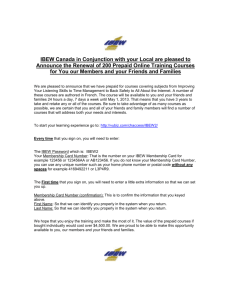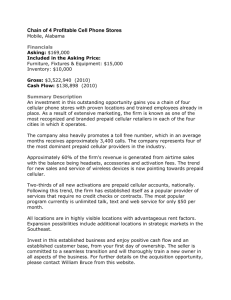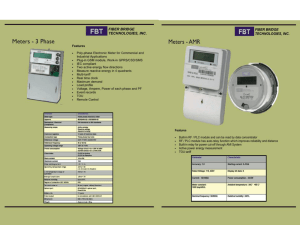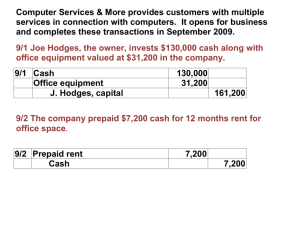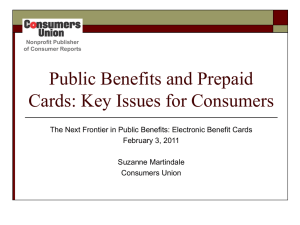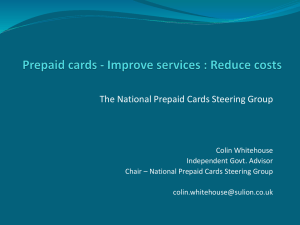Project Achievements - Water Services Trust Fund
advertisement
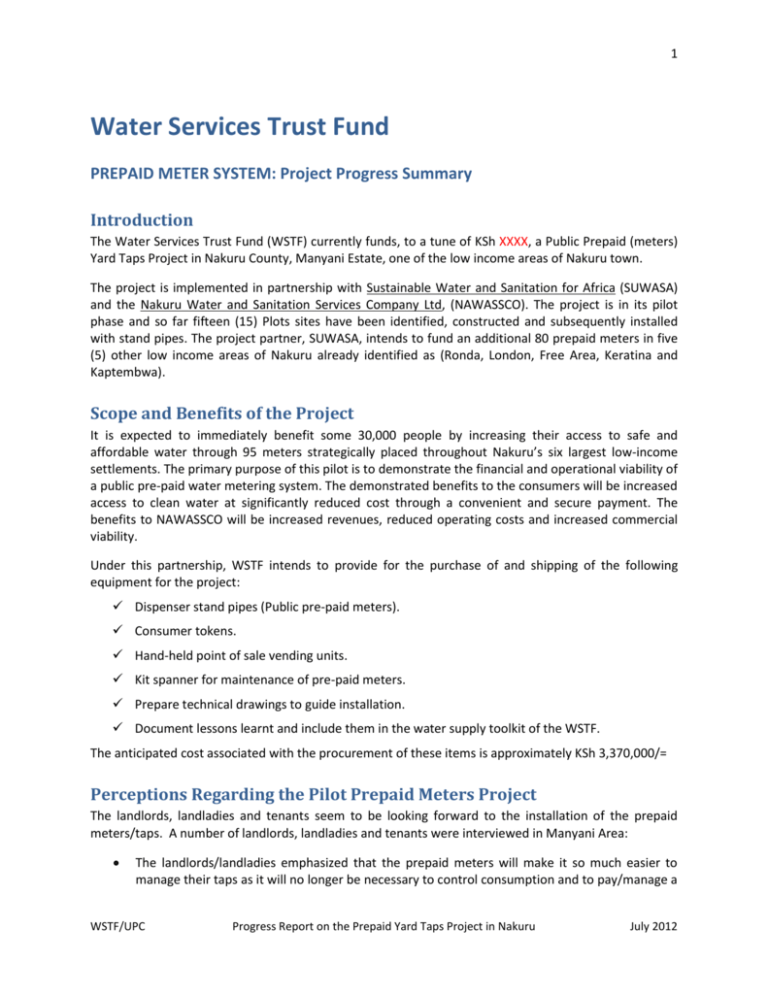
1 Water Services Trust Fund PREPAID METER SYSTEM: Project Progress Summary Introduction The Water Services Trust Fund (WSTF) currently funds, to a tune of KSh XXXX, a Public Prepaid (meters) Yard Taps Project in Nakuru County, Manyani Estate, one of the low income areas of Nakuru town. The project is implemented in partnership with Sustainable Water and Sanitation for Africa (SUWASA) and the Nakuru Water and Sanitation Services Company Ltd, (NAWASSCO). The project is in its pilot phase and so far fifteen (15) Plots sites have been identified, constructed and subsequently installed with stand pipes. The project partner, SUWASA, intends to fund an additional 80 prepaid meters in five (5) other low income areas of Nakuru already identified as (Ronda, London, Free Area, Keratina and Kaptembwa). Scope and Benefits of the Project It is expected to immediately benefit some 30,000 people by increasing their access to safe and affordable water through 95 meters strategically placed throughout Nakuru’s six largest low-income settlements. The primary purpose of this pilot is to demonstrate the financial and operational viability of a public pre-paid water metering system. The demonstrated benefits to the consumers will be increased access to clean water at significantly reduced cost through a convenient and secure payment. The benefits to NAWASSCO will be increased revenues, reduced operating costs and increased commercial viability. Under this partnership, WSTF intends to provide for the purchase of and shipping of the following equipment for the project: Dispenser stand pipes (Public pre-paid meters). Consumer tokens. Hand-held point of sale vending units. Kit spanner for maintenance of pre-paid meters. Prepare technical drawings to guide installation. Document lessons learnt and include them in the water supply toolkit of the WSTF. The anticipated cost associated with the procurement of these items is approximately KSh 3,370,000/= Perceptions Regarding the Pilot Prepaid Meters Project The landlords, landladies and tenants seem to be looking forward to the installation of the prepaid meters/taps. A number of landlords, landladies and tenants were interviewed in Manyani Area: The landlords/landladies emphasized that the prepaid meters will make it so much easier to manage their taps as it will no longer be necessary to control consumption and to pay/manage a WSTF/UPC Progress Report on the Prepaid Yard Taps Project in Nakuru July 2012 2 (usually high) water bill. Access to safe water will cease to be the responsibility of the landlord as every tenant can decide to register and obtain his or her own token. Tenants mentioned the fact that water, when not being rationed, will be available 24/7 and that they will no longer depend on the landlord or on the capacity of other tenants to pay their part of the water bill. In this context it is important to note that landlords, in order to prevent being faced with a high water bill, often restrict access to their yard tap. Some landlords actually tell their tenants to go fetch at the nearest water kiosk or use the services of (informal) water resellers that charge exorbitant prices. Others decide to sell water by the (20-litre) jerrycan. Such strategies are often used by landlords and landladies to prevent water consumption on their plot to enter a higher tariff bracket. Some plots get disconnected as the landlord/landlady is unable to make his/her tenants pay the (additional) amount required to settle NAWASSCO’s bill. The prepaid yard taps are expected to put an end to water disconnections. Completed Activities Within the framework of the Prepaid Meters Pilot Project the following activities have already been undertaken: The sites for the 15 pilot prepaid meters in Manyani Area have been identified and the landladies, landlords and (most) tenants are aware of the project. The areas for the up-scaling phase (80 additional prepaid meters) have been identified (Ronda, London, Free Area, Keratina and Kaptembwa). Water will be sold by NAWASSCO at the prepaid yard tap/meter for a retail tariff of KSh1.20 per 20-litre Jerrycan. All the prepaid meters, hand-held devices, computer software (etc.) have been ordered from Elster-Kent in South Africa and have been delivered. An additional 80 prepaid meters, handheld recharging devices and 6,000 tokens have been ordered. These prepaid meters will be installed in the five (5) up-scaling project areas NAWASSCO has the computers available that meet the specifications required for the installation of the prepaid meters management software. The Project Task Team has been established and is composed of NAWASSCO staff, SUWASA, WSTF (staff and Field Monitors), Nairobi Iron Mongers staff, the Public Health Officer, Chiefs, community leaders, members of the Manyani Landlords Association. On-Going Project Activities during the Project Operation Phase The following activities are being undertaken during the project operation phase: Technical and software aftercare is being provided by Nairobi Iron Mongers. The Project Task Team will assess the demand for additional (non-project) prepaid meters/yard taps. The team will also assist the Company with the development of a strategy and a set of procedures and other tools which enable NAWASSCO to take advantage of the expected demand for prepaid meters. The (social) marketing of prepaid meters/yard taps approach will be rooted in a careful analysis of the advantages and disadvantages of the prepaid system as well as in the careful calculation WSTF/UPC Progress Report on the Prepaid Yard Taps Project in Nakuru July 2012 3 of the total as well as the per capita investment costs of the pilot project and of the up scaling phase in areas like London and Free Area. Community and residents’ sensitization and education programme. Project Achievements So far the project has achieved the following: Project awareness and sensitization is deeply entrenched among the project beneficiaries. Three pre-paid metering systems are efficiently operational. Of the fifteen (15) plots, residents of three plots have started consuming water using the new technology. Residents have registered and have tokens each which they recharge at NAWASSCO Regional Offices at manageable units of at least KSh 50/=. Residents manage on their own, the amount of water drawn, time for drawing water and amount they recharge the token with. Plot residents have posters detailing how to use/operate the system. Community is very receptive of the new technology. There are no more long queues at the water collection points. Water wastage at the collection points is negligible. The Community Sensitisation and Users’ Education Programme The community education programme currently consists of the following elements/activities: The Prepaid Meter Itself: How does the prepaid meter work? How to use the prepaid yard tap? Keeping the prepaid yard tap in tip-top condition. Keeping the prepaid yard tap clean; a shared responsibility. Why it is rather futile to vandalize the prepaid meters (no money or valuable materials inside). How the Company can identify by-passes by monitoring consumption (?) How to report damage and poor- or non-functionality? How to manage your prepaid yard tap (targeting landlords & landladies). Customers are discouraged from using small receptacles for fetching water as this leads to increased wear and tear, decreased battery life and to more water wastage. Preferably users should use a container with a minimum size of 10 liters but the use of a 20-Litre Jerrycan is highly encouraged. The sensitization programme also includes explanations on the NAWASSCO rationing programme. As an initial step the Project Task Team has developed a set (3) of laminated posters (size A4) that have since been provided to all landlords/landladies and tenants who live within a yard that has a prepaid yard tap. These posters will help address the following issues: Poster 1: How to apply for a prepaid yard tap and how to obtain a token. Poster 2: How to use the prepaid yard tap and how to recharge the token. Poster 3: Customer care and complaints. WSTF/UPC Progress Report on the Prepaid Yard Taps Project in Nakuru July 2012 4 Sale and Recharging of Tokens: All token holders are regarded as customers of the WSP. Previously only the landlords were considered to be NAWASSCO customers. NAWASSCO proposed a deposit of KSh 300/= to be paid by each prepaid customer (token holder). Of this amount KSh 100 would be water credit and KSH 200 a refundable deposit. Customers, Tokens & Billing: NAWASSCO has carried out a detailed inventory of all potential customers of the prepaid system (i.e. all tenants and households of resident landlords/landladies). As soon as a household registers as a new prepaid (token) customer, the Company will ask the new customer to provide full personal and household details and to present an ID. Subsequently a digital photo of the customer is taken which is kept in the same digital file which becomes part of NAWASSCO’s customer database. NAWASSCO has already developed a database register. The Project Task Team will develop an easy and transparent procedure which customers have to follow if they want to apply for (1) a prepaid yard tap or for (2) a token. Additional Demand for Prepaid Meters Within the framework of the Prepaid Meters Project in Nakuru only a limited number of prepaid meters/yard taps will be installed. It can be expected, however, that the pilot project, especially if it is perceived as being successful by landlords/landladies, will trigger the demand for additional prepaid meters. NAWASSCO can submit a proposal for additional prepaid meters/yard taps WSTF-funded project as long as demand can be categorized as being pro-poor. This means that the prepaid meters should be installed in yards where tenants with low incomes reside. The Project Challenges Logbook In order to ensure that during the up-scaling phase of the NAWASSCO project and the up-scaling of prepaid meters/yard taps country-wide valuable lessons learnt are not lost, the project will introduce a Project Challenges Logbook. This logbook will not only contain a list of challenges but equally the solutions that were developed to overcome these challenges. In other words, dealing with specific challenges may result in the development of specific procedures, training activities, sensitization posters, technical designs, etc. The WSTF proposes that the Technical Field Monitor of the WSTF establishes and updates the logbook. Monitoring & Evaluation The monitoring and evaluation phase of the Prepaid Meters Pilot Project in Nakuru will focus upon the analysis of the commercial, social and technical viability of the prepaid meters system. This analysis will be carried out by the entire Project Task Team. The lessons learnt will be used to improve the approaches and tools that were developed and implemented during the project or to develop new ones. ___________________________________________________ Prepared by: Lawrence Ojwang, Social Field Monitor - WSTF WSTF/UPC Progress Report on the Prepaid Yard Taps Project in Nakuru July 2012
